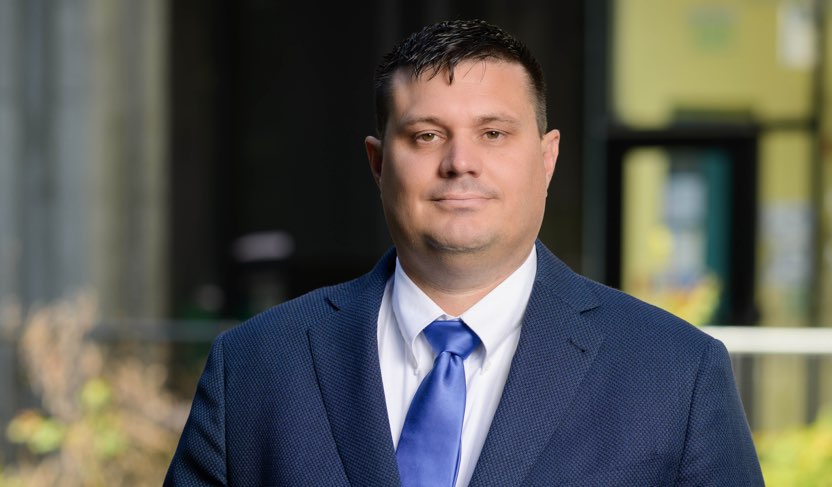Campus News
Q&A with John MacMillan, vice chancellor for research
After nearly two years as the interim Vice Chancellor for Research (VCR) for UC Santa Cruz, John MacMillan was appointed to the permanent VCR role on June 1, 2023, after a nationwide search. Here he discusses his vision for UC Santa Cruz and its research enterprise.

After nearly two years as the interim Vice Chancellor for Research (VCR) for UC Santa Cruz, John MacMillan was appointed to the permanent VCR role on June 1, 2023 after a nationwide search. Here he discusses his vision for UC Santa Cruz and its research enterprise.
Q: Tell me a little bit about yourself and what drives you in your work.
A: One of the things that really motivates me in this position is being a first-generation college student. I was given the opportunity to carry out undergraduate research while I was at the University of Iowa, and that really opened up a lot of possibilities for my future. Research has given me a lot in life, and I’ve seen the tremendous benefits to both researchers and the greater public that comes out of high-quality research. The ability to support [research] on our campus was an exciting prospect for me.
Q: You have been focusing a lot on the student experience. What are your plans to support undergraduate and graduate research?
A: The evidence is clear that experiential learning opportunities help students succeed, graduate, and excel in internships, professional school, graduate school, and real-world careers. As an R-1, HSI (Hispanic-Serving Institution) university, we have a vital role in increasing these opportunities, especially for those of diverse backgrounds. We aim to help faculty expand REUs (Research Experiences for Undergraduates) through funding from organizations like the National Science Foundation (NSF) to enhance lab courses and provide paid undergraduate researcher opportunities. Our goal is to ensure students have access to the newest research and gain valuable hands-on experience, better preparing them for their future endeavors.
Q: What is your vision for the Office of Research?
A: Over the past decade, the campus has experienced significant growth in various areas, including funding, impact, and student population. However, the support systems have not grown at the same pace as scientific advancements, leading to some growing pains. Our vision is to ensure the research infrastructure is well-supported and that we are providing administrative support as well as cutting-edge facilities. Additionally, we recognize the need to promote and share the truly amazing research happening on our campus. We aim to tell the stories of our work, engage alumni, and support UC Santa Cruz research in meaningful and impactful ways. Selling ourselves better is one step towards achieving this goal.
Q: What does UCSC do really well in regard to research?
A: UC Santa Cruz is known for its excellence in research across all divisions, including arts, humanities, physical sciences, social sciences, and engineering. What sets UC Santa Cruz apart is its commitment to social justice and diversity, interwoven into all disciplines. For example, the pangenome project explores diversity in our genetic code. UC Santa Cruz also excels in community engagement, collaborating with communities to identify and work towards solutions for complex challenges in areas such as climate change and public health. None of these accomplishments would be possible without the contribution of truly amazing faculty members who are leaders in their respective fields.
Q: Under your leadership, UC Santa Cruz established the Innovation & Business Engagement (IBE) Hub, and the Center for Coastal Climate Resilience, a $20 million initiative to address the impacts of climate change on our coastal communities in California. What other initiatives do you have in the pipeline?
A: The Office of Research recognizes the importance of fostering new ideas and collaborations, and we are starting to support this through internal funds. We are excited to invest in UC Santa Cruz research through another round of seed funding and implementation. We will allocate $5-6 million in funding in the next few weeks. We are also focused on facilitating interdisciplinary research, understanding the opportunities and barriers, and finding efficient ways to make it work. We are conducting a listening tour to gather perspectives and guidance to achieve this. Additionally, we will establish a VCR advisory committee consisting of associate deans to address complex research-related issues and provide guidance to our office.
Q: Anything else you’d like to share?
A: It’s an interesting time at the federal level for research security and open data. While we recognize the challenges posed by foreign influence, we also support and promote our commitment to academic freedom. We also have a new partnership, the Teaching & Learning Center and HSI initiative, in which we will share a staff member jointly on education grants. This collaboration aims to push the limits of new pedagogical approaches and support minority research programs.